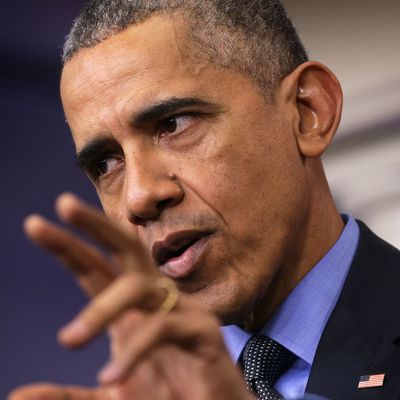
There he goes again: President Barack Obama is issuing an executive order to tighten regulations of gun sales to make background checks modestly more effective. And in doing so, Obama is thumbing his nose at Republicans who claim his habit of end-running the legislative branch to act on his own reveals a dictatorial temperament and perhaps even a threat to the Constitution. Out in the fever swamps, the conspiracy theory holding that Obama is going to cancel the presidential elections and rule by decree will gain new adherents. And here and there (and from “centrist” pundits as well as Republicans) you will hear angry talk about the president once again betraying the bipartisanship he promised to bring to Washington back in 2008. You’ll even hear some progressive and Democratic validation of this treatment in the form of claims that Obama is pursuing extremism in the defense of this or that urgent policy goal.
Obama himself laid the political groundwork for this action not by insisting on his as opposed to Republicans’ ideas about gun safety, but by noting repeatedly that the Republican-led Congress has refused to act even in the wake of catastrophes like those at Sandy Hook and San Bernardino. Here’s the relevant statement from the White House:
The president has made clear the most impactful way to address the crisis of gun violence in our country is for Congress to pass some common sense gun safety measures. But the president has also said he’s fully aware of the unfortunate political realities in this Congress. That is why he has asked his team to scrub existing legal authorities to see if there’s any additional action we can take administratively.
If you look back at Obama’s record on big executive actions — on guns, climate change, and immigration — you see the same situation. It’s not that he’s fought for “liberal” as opposed to “conservative” policies in these areas. It’s that congressional Republicans, pressured by conservative opinion-leaders and interest groups, have refused to do anything at all. They are in denial about climate change and in paralyzing internal disagreement on immigration, and refuse to consider any new gun regulations. So there’s literally no one to hold bipartisan negotiations with on these issues, and no way to reach common ground. In all these cases, the absence of action creates its own dreadful policies, most notably on immigration where a refusal to set enforcement priorities and to fund them forces arbitrary actions no one supports.
So taking executive actions is hardly a betrayal of bipartisanship, but rather a forlorn plea for it. And it’s significant that Obama is usually acting on issues in which the Republican rank-and-file are far more supportive of action than their purported representatives in Congress.
Back during his announcement of candidacy in 2007, Obama made it reasonably clear that he didn’t just want to cut deals between the two parties in Washington, but also intended to force action on them when gridlock prevailed. After discussing several national challenges, he said:
What’s stopped us from meeting these challenges is not the absence of sound policies and sensible plans. What’s stopped us is the failure of leadership, the smallness of our politics — the ease with which we’re distracted by the petty and trivial, our chronic avoidance of tough decisions, our preference for scoring cheap political points instead of rolling up our sleeves and building a working consensus to tackle big problems.
Knowing that a Republican president could and probably would roll back all his executive actions, Obama is not taking a preferred course of action. If, of course, a Democratic succeeds him, his policies will take root and probably endure. Eventually, the two parties may come to agree on the challenges the country faces, and then have actual discussions — and disagreements and competition — over how to address them. That’s bipartisanship. And counterintuitive as it may seem, Obama’s executive actions may be necessary to produce bipartisanship down the road.






























